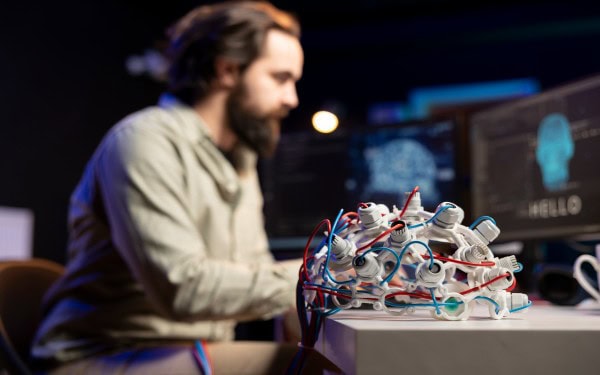This article explores the transformative potential of artificial intelligence in supporting individuals with diverse neurological profiles. From personalised learning programmes to innovative therapy apps, we examine how AI-driven solutions are reshaping support for this unique population. By highlighting the synergies between cutting-edge technology and neurodiversity, we reveal how these advancements are improving quality of life and opening new possibilities.
The Dawn of AI-Powered Support for Cognitive Diversity
In recent years, artificial intelligence has made remarkable strides, with its application in supporting individuals with diverse neurological conditions emerging as a particularly promising area. As our understanding of these conditions deepens, AI technologies are opening up new avenues for personalised support, education, and therapy that were previously unimaginable. The concept of neurodiversity encompasses a wide range of neurological variations, including autism spectrum disorders, ADHD, dyslexia, and more. This perspective recognizes these differences not as deficits to be corrected, but as natural and valuable aspects of human diversity. AI technologies are now being harnessed to support and celebrate this diversity in unprecedented ways. The power of AI lies in its ability to process vast amounts of data and identify patterns that might escape human observation. In the context of supporting cognitive diversity, this translates to highly personalised digital health solutions that can adapt in real-time to an individual’s unique needs, preferences, and strengths.
Revolutionising Education with AI-Driven Learning Programmes
One of the most exciting applications of AI in this field is in education. Personalised learning programmes powered by artificial intelligence are transforming the educational landscape for students with diverse neurological profiles, offering tailored experiences that traditional methods often struggle to provide. AI-driven adaptive learning platforms (i.e. adaptive learning ecosystems) are at the forefront of this educational revolution. These systems use sophisticated algorithms to continually assess a student’s performance, learning style, and engagement levels. Based on this real-time data, the platform adjusts its content delivery, difficulty level, and even the format of materials to best suit the individual learner. For example, a student with dyslexia might benefit from audio-based content and voice recognition tools, while a learner with ADHD might engage better with interactive, gamified lessons. AI can seamlessly make these adjustments, ensuring that each student receives an optimised learning experience.
Intelligent Tutoring Companions
Taking personalization a step further, AI-powered intelligent tutoring systems act as tireless, patient companions in the learning journey. These virtual tutors can:
- Provide instant, constructive feedback on assignments
- Offer additional explanations and resources when a student struggles with a concept
- Adapt their teaching style to match the student’s preferred way of learning
- Track long-term progress and identify areas needing extra attention
By offering this level of individualised support, intelligent tutoring systems help students build confidence and develop effective learning strategies tailored to their unique cognitive profiles.
Enhancing Therapy and Support with AI Apps
Beyond education, AI is making significant inroads in therapeutic applications, offering new tools and approaches to support individuals with diverse neurological conditions in their daily lives. For individuals on the autism spectrum who may struggle with interpreting social cues, AI-powered apps are becoming invaluable tools. These applications use computer vision and natural language processing to analyse facial expressions, tone of voice, and body language in real-time. They can then provide gentle cues or explanations to the user, helping them navigate social interactions more confidently. AI-driven apps are proving to be powerful allies for individuals with ADHD and other conditions that affect executive function. These digital assistants can:
- Break down complex tasks into manageable steps
- Provide timely reminders and help with time management
- Offer strategies for focusing and managing distractions
- Adapt to the user’s behaviour patterns to provide increasingly personalised support
By offloading some cognitive load, these tools allow individuals to focus their energy on their strengths and passions.
Navigating Challenges and Ethical Considerations
While the potential of AI in supporting cognitive diversity is immense, it’s crucial to approach these developments with careful consideration of the challenges and ethical implications they present. The effectiveness of AI systems often relies on processing large amounts of personal data. When dealing with sensitive information related to neurological conditions, maintaining robust data protection measures is paramount. Developers and healthcare providers must prioritise user privacy and implement stringent security protocols to safeguard this valuable and personal information. As with any AI system, there’s a risk of perpetuating or amplifying existing biases. In the context of cognitive diversity, this could lead to misrepresentation or misunderstanding of certain conditions. It’s crucial that AI systems are developed with diverse input and continuously monitored for bias. Involving individuals with varied neurological profiles in the development and testing processes can help ensure these technologies truly serve their intended users. While AI offers remarkable support tools, it’s essential to remember the irreplaceable value of human interaction and professional guidance. Technology should augment, not replace, human support systems. The right balance between AI-driven tools and human care is key to providing holistic support for individuals with diverse cognitive profiles.
The Future Landscape of AI and Cognitive Support
As we look to the future, the potential for AI to further enhance support for cognitive diversity is boundless. Researchers like Dr. Christian Beste are at the forefront of exploring these possibilities. Dr. Beste’s research suggests that emerging trends could include AI-assisted diagnostic tools, brain-computer interfaces, and advanced predictive models that could help people tailor their education and careers to their strengths and interests.
The journey of integrating AI into support for cognitive diversity is just beginning, and the road ahead is filled with promise. As these technologies continue to evolve, they have the potential to create more inclusive, understanding, and supportive environments across all aspects of life. Christian Beste emphasises the importance of interdisciplinary collaboration in this field, bringing together experts in AI, neuroscience, and psychology to drive innovation.
In conclusion, the intersection of artificial intelligence and neurodiversity represents a frontier of innovation and opportunity. By harnessing the power of AI, we can create more inclusive, adaptive, and empowering systems that celebrate cognitive diversity. As we move forward, it is essential to approach these developments thoughtfully, always keeping the needs and experiences of neurodiverse individuals at the heart of innovation. Through careful implementation and ongoing refinement, AI has the potential to unlock new possibilities and enhance the quality of life for neurodiverse individuals, contributing to a more inclusive and understanding world for all.







